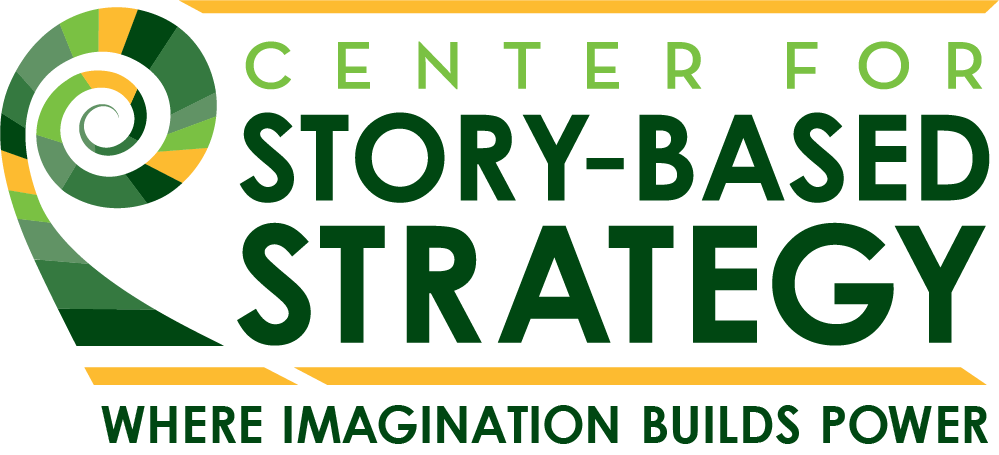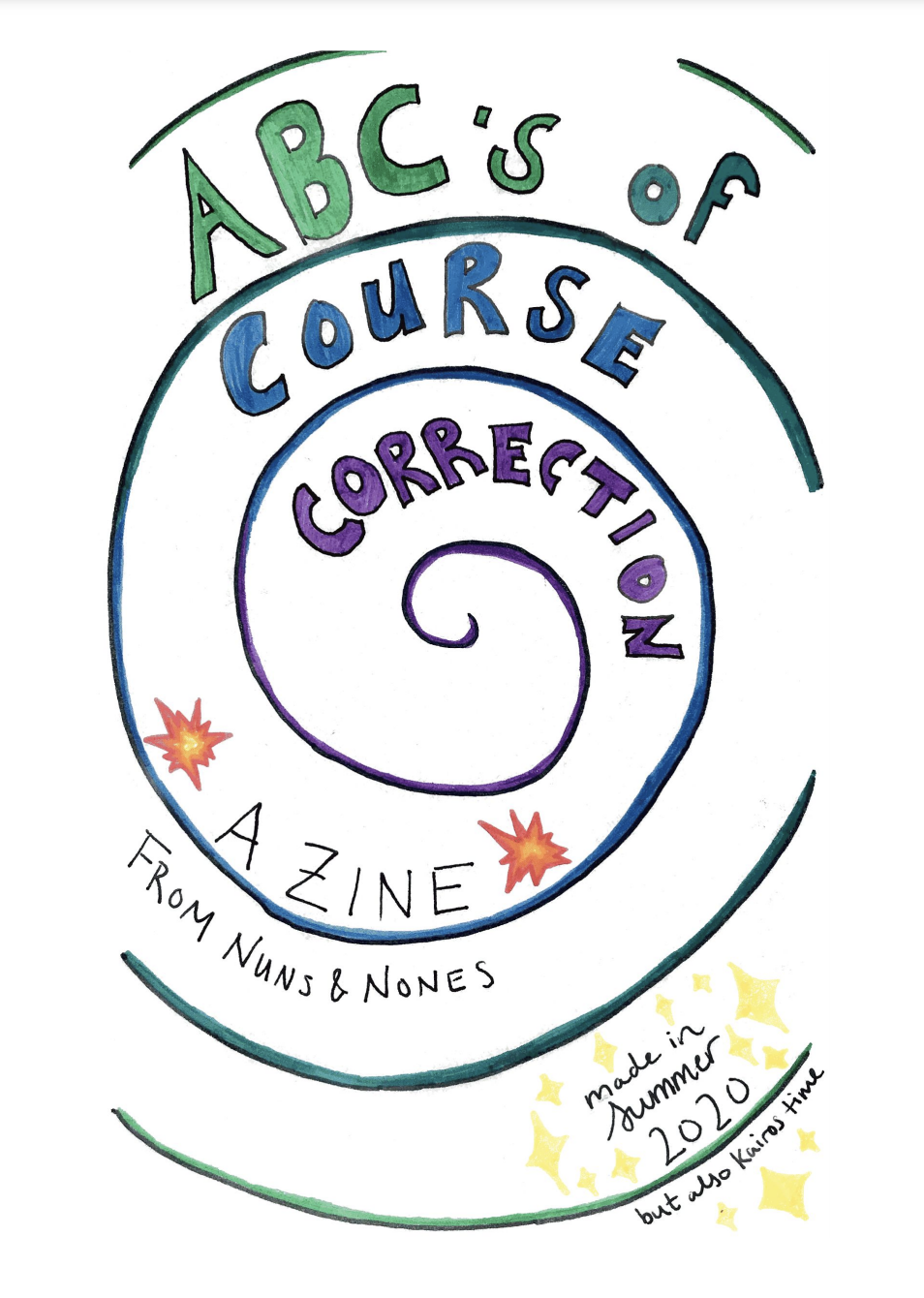Reality, Story, Repair, Repeat: Using story-based strategy to move toward cycles of repair
Describe yourself in three words.
edge-dancer, web-weaver, tunnel-builder (lol, hyphenator)
Tell us about yourself.
I am a popular educator, artist, and organizer and I live on Massachusett land (so-called Cambridge, MA).
Tell us about the work you brought into your Fellowship.
Nuns & Nones is an alliance of spiritually diverse young folks, women religious, and friends working to create communities of care and contemplation that incite courageous action.
I came to work with Nuns & Nones the way I have come into most of my work in the world, through seeking to be in the work of getting free in deep collaboration and community with my people. That search brought me into solidarity economies work, into popular education, into Jewish organizing, and into conversation with a whole lot of folks who are also my people — people who are asking about and experimenting with the kinds of spiritual community that can support us to be courageous and connected in this time.
The Fellowship also happened shortly before I transitioned off of the Nuns & Nones team. This is work I’m proud to have contributed to and excited to watch unfold. It has transformed me, too, recruiting me into cycles of repair that are playing out in Nuns & Nones and pretty much everywhere else I look.
Explain to us why you are doing this work.
Even before it became the work of this fellowship and the work that was happening at Nuns & Nones, I’ve been working with this idea of what repair means in a fractal way.
What does it mean to repair my ancestral line and the ways in which I’ve been disconnected from culture and spirit in the process of becoming white? What does it mean to do repair in a community in which I am an organizer, a neighbor, a family member, and also a gentrifier? And what does it mean to do this on a large scale, being connected to some of the institutions with the greatest legacy of extraction and exploitation, like in the history of the world?
I am working on repair, on healing, at all of these different levels. Applying this frame of repair is powerful — it changes how I understand all kinds of processes happening inside of households, families, organizations, communities, and obviously also nation states and continents...
Share how folks can get involved with your work or see your work’s final product.
Check out the Nuns & Nones website, and check out the dope zine that we made after 200 members of our network took Movement Generation’s Course Correction. Folks can also check out this story about how we engaged with the 2020 elections, through a lens of repair.
How would you describe Story-based Strategy (SBS) to someone who has never heard about it?
We tell stories about reality. But we also tell stories to change reality. Those two things are in a dynamic conversation. Reality, story, reality. Story-based Strategy, to me, creates systems and practices for telling a story in such a way that you're able to shape reality toward getting your people free.
How did SBS affect your work on the project?
Using SBS in this work was permission giving in a bunch of ways.
It was permission giving because of the emphasis on rapid prototyping, the invitation to play and experiment with different ideas to see what sticks, and to support the Nuns & Nones team and our network in doing that.
“By starting with a framework of story as strategy, SBS allowed us to just begin to tell stories about what was bubbling up at various places in the network rather than jumping too quickly to programmatic strategy.”
And I think it was also permission giving in allowing us to listen for this larger story that is emerging from this magical alliance of young spiritual seekers and Catholic women religious. By starting with a framework of story as strategy, SBS allowed us to just begin to tell stories about what was bubbling up at various places in the network rather than jumping too quickly to programmatic strategy. When we listened for a long time and to a lot of voices, we began to see which elements of the stories were throughlines and those eventually became a kind of glue for the work.
And I think it made us much more rigorous about intervention points. For example, SBS helped us think about how we wanted to engage in the Fall 2020 election. It made it really clear that we wanted to be working in partnership with others who were telling similar stories about a long term vision beyond elections. SBS also helped us clarify that we did want to be visible, but in a way that had us in the right role in the story that aligned with the larger arc of our work.
How was working on this project, using SBS, different from your work without SBS?
Do we ever not use SBS? 😂
That said, one thing we did at Nuns & Nones was work to build everyone's capacity to use these tools. Increasingly there was shared language within our team. And so it was able to be much more alive than it is in teams where we’re the only ones using it in the context of a group that isn’t thinking about things that way.
It's not just story-based strategy, though. I think it's a way to come at strategy just in general. It really resonates with me as a dancer and as an artist and in all the other ways that I show up in the world: to come at strategy through story. I find that what we come up with, in the context of story, makes us better organizers. Because it’s an invitation. We're inviting people into a story of why this stuff matters.
Without story, we can move through a series of activities that feel fairly disconnected from each other. Internally to campaigns, or work on projects like N&N, it helps with coherence. And in a way, having a sense of the narrative arc is a helpful constraint that supports people's creativity.
If you could have another iteration of your work, how would it have changed?
Um, we wouldn't be in a pandemic and we'd be able to get together in person instead of doing all this shit on Zoom? Can I wish for that? Right when the pandemic started, we were getting ready to launch a movement house program, with young people living in community with sisters across the country. And we obviously couldn't do that. So much of what has happened since has been trying to figure out how to ground this work in place in the context of these huge constraints.
And yet, there’s really interesting stuff happening in the context of the pandemic around what’s unfolding for sacred spaces, from monasteries to retreat centers to other places of sanctuary and hospitality that have had to re-evaluate everything. How do these places continue to be incubators for the healing work they’ve been trying to support forever?
Beginning to move toward this work of repair uncovered a possibility and a need for deeper partnerships, alliances and following leadership of all of the many Black and Indigenous-led groups who are moving reparations and landback work. As we were starting it felt like trying to move the work and build the relationships at the same time. Putting a visionary story out there, that felt so powerful in its possibility and in how big it felt, actually supported slowing down and building deeper support and accountability.
Nuns & Nones is also beautifully intergenerational. And that's so much of the power of it, the eldering that unfolds in the context of these kinds of partnerships. There is a treasuring of the spiritual eldership of Catholic sisters. And, there is a deep desire and an unfolding commitment to explore more expansive spiritual eldering from many different communities, who have different relationships to the concept of repair. This will shape future cycles of this work in such important ways.
Do you think SBS will change how you relate to future work in collaboration with others? How? And why?
There's something potentially liberating about the ways in which story-based strategy can uncover possible affinities and alliances across identities. It can point toward building new and sometimes unlikely relationships with folks who have access to the same point of intervention, or folks engaging similar audiences and targets around complimentary struggles.
“There’s something potentially liberating about the ways in which story-based strategy can uncover possible affinities and alliances across identities.”
Over and over, my dear friend and collaborator Elandria Williams taught me how powerful it is to ask: “Who are your people?” Often people answer that question based on their identities, their geographies, their institutional affiliations, and all of that is real. And so often we can become each other’s people when we see that we might build our power by teaming up in specific ways, by having the opportunity to do something beautiful together. SBS is a way to get specific about those possibilities.
Is there anything else you want to say?
Our fellowship cohort was a really unlikely constellation. And yet I'm constantly amazed by how putting folks together, you begin to see how almost any set of projects can become sort of puzzle pieces that talk to each other in really creative ways. And you never would have known they could fit together without this container. I think there's something really powerful about not just doing story-based strategy with people you're in the work with, but also doing it with people who are doing really different stuff.
Because in the end, we're all trying to transform the same systems.



